七下Unit 2 What time do you go to school? 单元复习课件(23张PPT)
文档属性
| 名称 | 七下Unit 2 What time do you go to school? 单元复习课件(23张PPT) |  | |
| 格式 | zip | ||
| 文件大小 | 4.9MB | ||
| 资源类型 | 教案 | ||
| 版本资源 | 人教新目标(Go for it)版 | ||
| 科目 | 英语 | ||
| 更新时间 | 2023-04-10 19:49:49 | ||
图片预览

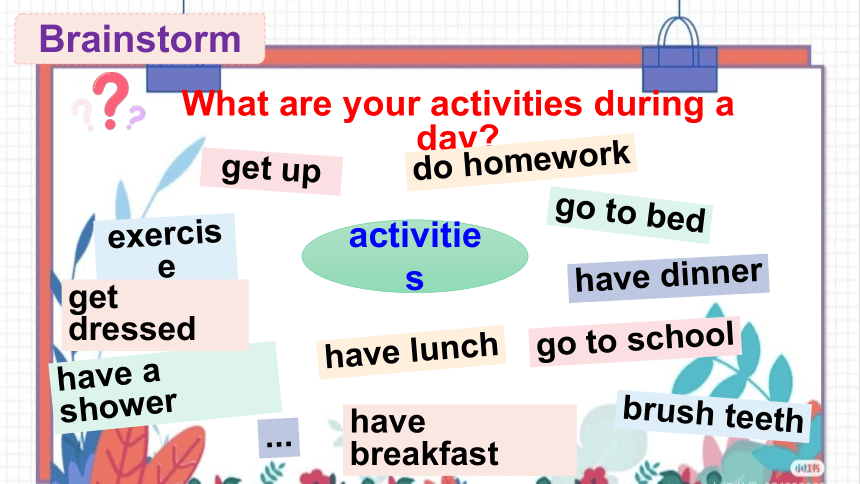
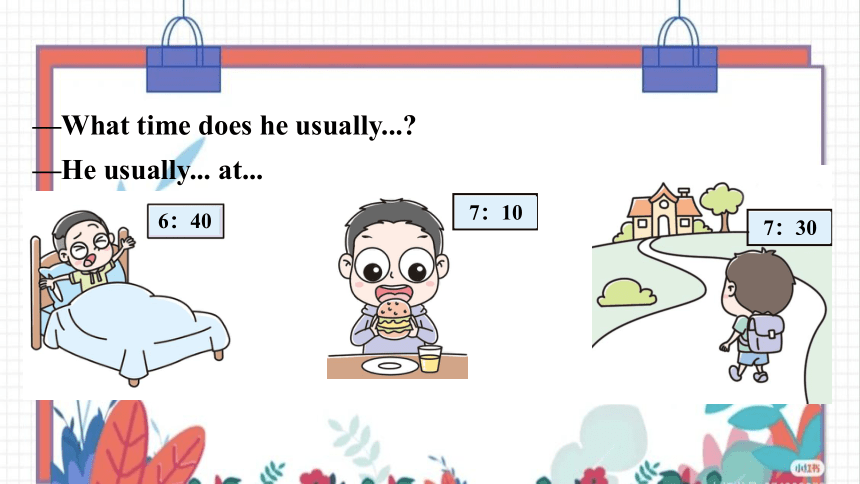
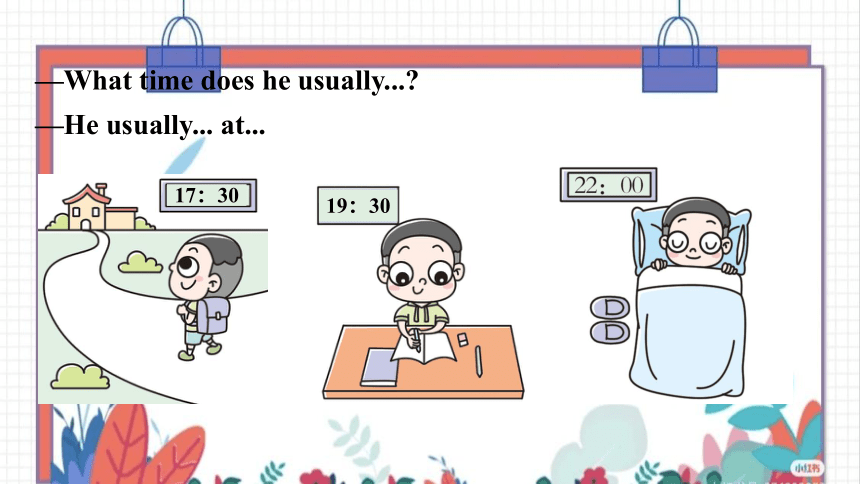
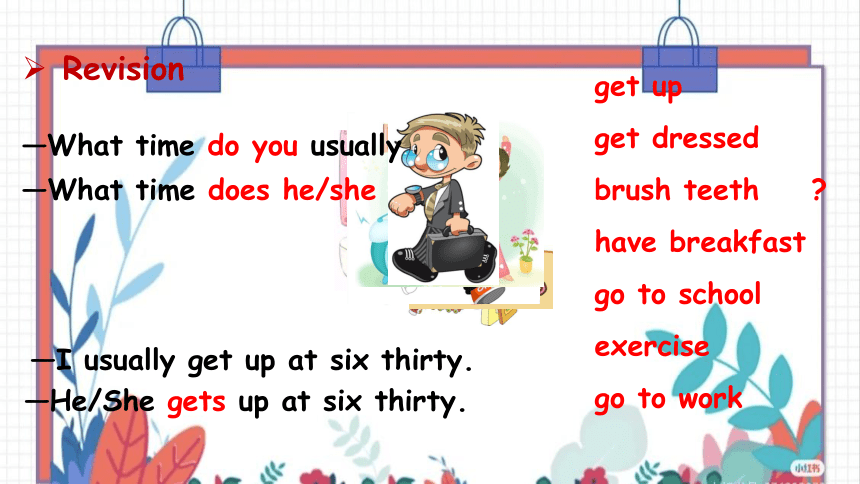
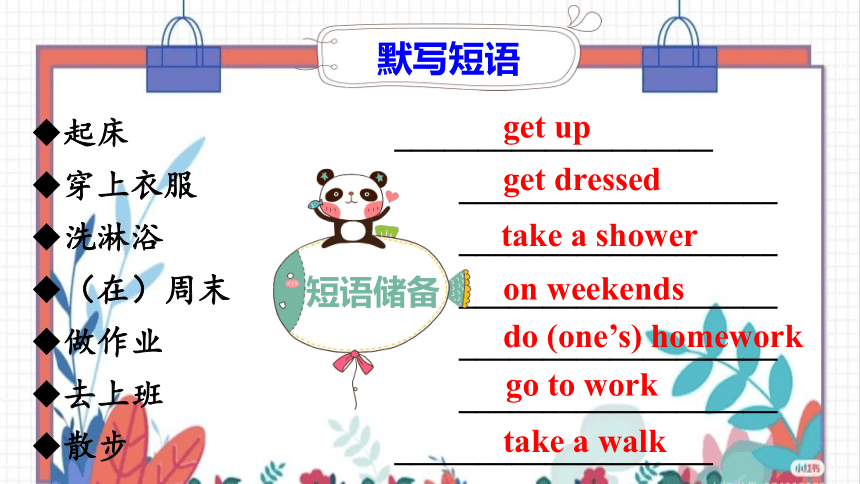
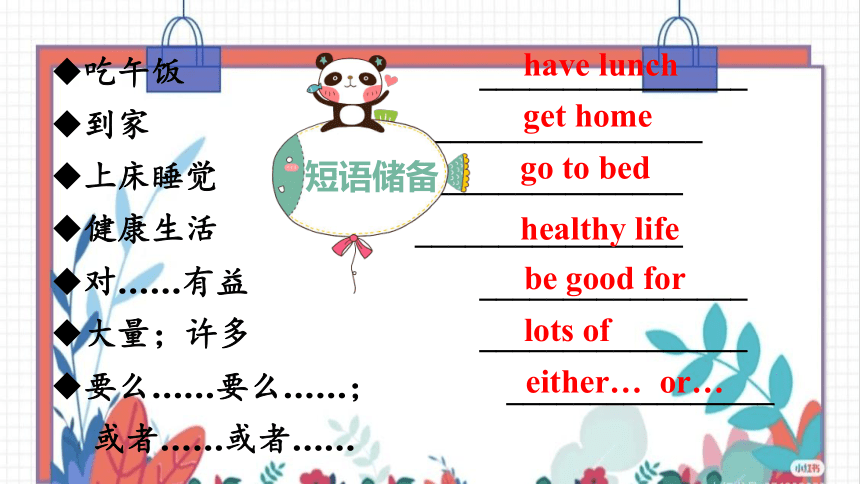
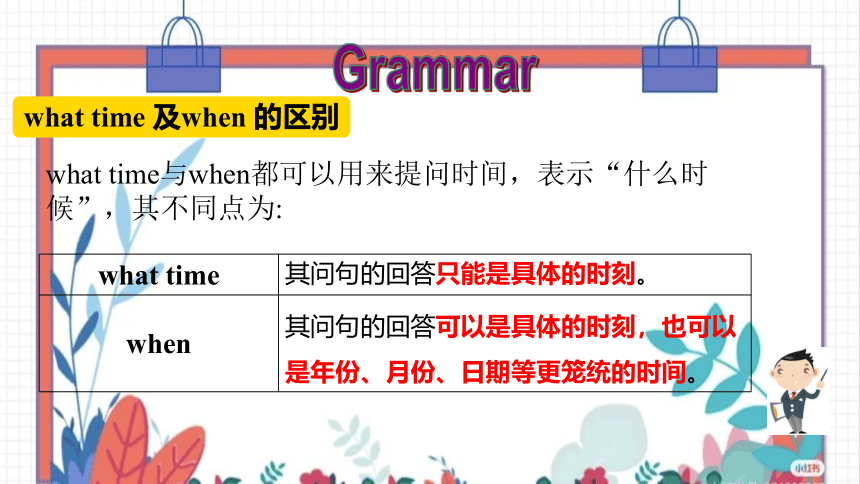
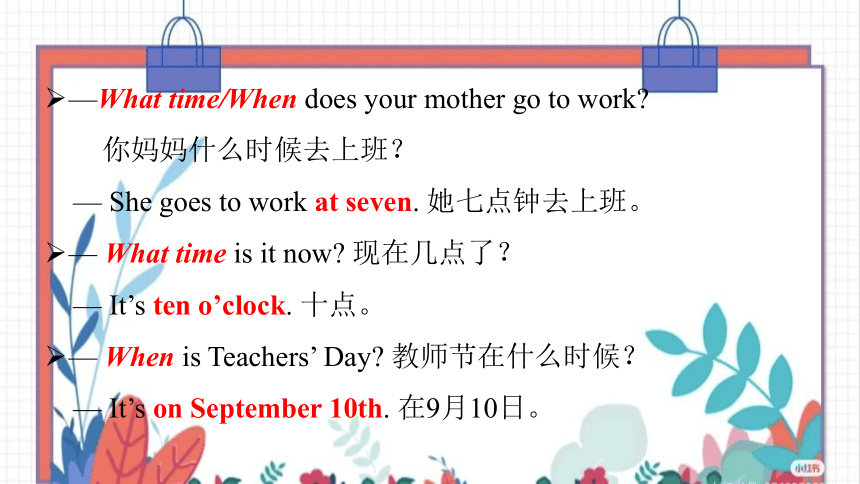
文档简介
(共23张PPT)
单元复习课件
Unit 2
What time do you go to school
Brainstorm
get up
go to bed
have lunch
exercise
have dinner
have a shower
get dressed
go to school
brush teeth
What are your activities during a day
do homework
have breakfast
activities
...
—What time does he usually...
—He usually... at...
6:40
7:30
7:10
—What time does he usually...
—He usually... at...
17:30
19:30
Revision
get up
get dressed
brush teeth
have breakfast
go to school
exercise
go to work
—What time do you usually
—What time does he/she
—I usually get up at six thirty.
—He/She gets up at six thirty.
起床 ___________________
穿上衣服 ___________________
洗淋浴 ___________________
(在)周末 ___________________
做作业 ___________________
去上班 ___________________
散步 ___________________
get up
get dressed
take a shower
on weekends
do (one’s) homework
go to work
默写短语
短语储备
take a walk
吃午饭 ________________
到家 ________________
上床睡觉 ________________
健康生活 ________________
对……有益 ________________
大量;许多 ________________
要么……要么……; ________________
或者……或者……
have lunch
get home
go to bed
短语储备
healthy life
be good for
lots of
either… or…
Grammar
what time 及when 的区别
what time与when都可以用来提问时间,表示“什么时候”,其不同点为:
what time 其问句的回答只能是具体的时刻。
when 其问句的回答可以是具体的时刻,也可以是年份、月份、日期等更笼统的时间。
—What time/When does your mother go to work
你妈妈什么时候去上班?
— She goes to work at seven. 她七点钟去上班。
— What time is it now 现在几点了?
— It’s ten o’clock. 十点。
— When is Teachers’ Day 教师节在什么时候?
— It’s on September 10th. 在9月10日。
what time 及 when引导的特殊疑问句
句式结构:What time/When + do/does +主语+动词原形+其他?
What time/When + be动词+主语+其他?
回答what time或when引导的问句,可以用in, on或at等组成的表示时间的介词短语。
【特别提醒】主语是第三人称单数时,问句中的助动词用does,实义动词用原形;答语中的谓语动词用第三人称单数形式。
频率副词
频度副词表示某一动作或状态出现的频率,即在一定时间内某一动作或状态重复出现的次数。频度副词通常用于一般现在时。(如:always, usually, often,never 等)
语法概述
never
usually
always
从不
很少
有时
经常
通常
总是
0%
20%
40%
60%
80%
100%
seldom
sometimes
常见频度副词
频度副词的位置
频度副词一般位于be动词、助动词或情态动词之后,实义动词之前。有时为了强调,频度副词也可位于句首。
My father is always busy. 我爸爸总是很忙。
She often plays the piano after dinner. 晚饭后,她经常弹钢琴。
Sometimes it rains heavily. 有时候雨下得很大。
【拓展延伸】对频率提问,用how often,表示“多久一次”。
—How often do you eat French fries 你多久吃一次炸薯条?
—Never. (我)从不吃。
My mother always gets up early. 我妈妈总是起床很早。
I usually go to bed at 10:00 every night. 我通常每天晚上十点上床睡觉。
They often play soccer on weekends. 他们经常在周末踢足球。
John sometimes comes late. 约翰有时候迟到。
My sister seldom cleans her bedroom. 我妹妹很少打扫她的卧室。
I never eat junk food. 我从不吃垃圾食品。
Exercises
一、单项选择。
1.—_____is the School Day —It’s on May 15th.
A. What B. When C. Where D. How
2._____ say that English is too difficult for us to learn. We
can learn it well with efforts.
A. Always B. Sometimes C. Seldom D. Never
3.My mother _____ goes to bed before 11 p. m. because she
has to finish all the housework.
A. always B. sometimes C. often D. seldom
B
D
D
4.—Do you like going mountain climbing
— Yes. I ____ do it on weekends with my friends.
A. seldom B. often C. never D. hardly
B
5.—_____do you get up every morning
—At seven thirty.
A. What color B. What size C. What time D. How often
6.We’ll have to say goodbye, my dear friends! But I will _____ forget the days we spent together.
A. always B. often C. never D. sometimes
C
C
二、按要求改写句子,每空一词。
1.Jim usually watches TV at eight in the evening.(对画线部分提问)
______ ______ does Jim usually watch TV in the evening
2. Alice always cleans her room on weekends. (对画线部分提问)
______ does Alice always clean her room
3.When does your brother go to school (改为同义句)
______ ______ does your brother go to school
What
time
When
What
time
Fill in the blanks and retell the passage.
①get up at →have a breakfast→go to school at eight thirty
②eat for lunch
③ after school
④do his homework first after getting home
⑤either or play computer games in the evening
⑥brush teeth and go to bed at ________
Tony的生活习惯(Para. 1)
eight
quick
hamburgers
play basketball
watch TV
ten thirty
①get up at →take a shower, eat a ________ breakfast→go to school at eight thirty
②eat lots of for lunch
③play volleyball after lunch
④eat after dinner
⑤do her homework, swim or take a walk in the evening
⑥go to bed at __________
Mary的生活习惯(Para. 2)
six thirty
good
fruit and vegetables
ice-cream
nine thirty
本单元以“日常作息习惯”为话题,写作时,要求学生能正确运用一般现在时,能正确表达时间和使用never, sometimes, often, usually, always等频度副词来谈论自己或他人的日常生活。
话题概述
Writing guidance
审题 体裁 记叙文 话题 介绍日常活动
时态 一般现在时 人称 第一人称
段落 布局
开篇点题 This is my/a(n)...day.
描述一天的活动
上午: get up; eat my breakfast;
go to school; have classes
中午: eat lunch…
下午: go home; play basketball
晚上: do homework; go to bed
句与句之间适当采用连接词:after that; and...
素材准备
短语
get up 起床
take a shower 洗淋浴
get dressed 穿上衣服
brush teeth 刷牙
go home 回家
take a walk 散步
...
句子
1. I always…every day. 每天我总是……
2. I usually... at... 我通常在……
3. I often... at... 我经常在……
4. Sometimes I... at... 有时我在……
Sample writing
I have a very healthy life. I always get up at 6:00 and take a shower at 6:05 every day.Then I get dressed at 6:20 and eat breakfast at 6:25. I brush my teeth at 6:50 and go to school at 7:00. I have lunch with my classmates at 12:00. I usually go home at 4:00 and do my homework from 4:15 to 6:45. I always have dinner at 7:00 and take a walk with my family at 7:45. I usually watch TV at 9:00 and go to bed at 10:00.
My day
标题
对一天的整体概述
运用句型和短语,按时间顺序描述一天的活动
整体采用一般现在时态,第一人称
单元复习课件
Unit 2
What time do you go to school
Brainstorm
get up
go to bed
have lunch
exercise
have dinner
have a shower
get dressed
go to school
brush teeth
What are your activities during a day
do homework
have breakfast
activities
...
—What time does he usually...
—He usually... at...
6:40
7:30
7:10
—What time does he usually...
—He usually... at...
17:30
19:30
Revision
get up
get dressed
brush teeth
have breakfast
go to school
exercise
go to work
—What time do you usually
—What time does he/she
—I usually get up at six thirty.
—He/She gets up at six thirty.
起床 ___________________
穿上衣服 ___________________
洗淋浴 ___________________
(在)周末 ___________________
做作业 ___________________
去上班 ___________________
散步 ___________________
get up
get dressed
take a shower
on weekends
do (one’s) homework
go to work
默写短语
短语储备
take a walk
吃午饭 ________________
到家 ________________
上床睡觉 ________________
健康生活 ________________
对……有益 ________________
大量;许多 ________________
要么……要么……; ________________
或者……或者……
have lunch
get home
go to bed
短语储备
healthy life
be good for
lots of
either… or…
Grammar
what time 及when 的区别
what time与when都可以用来提问时间,表示“什么时候”,其不同点为:
what time 其问句的回答只能是具体的时刻。
when 其问句的回答可以是具体的时刻,也可以是年份、月份、日期等更笼统的时间。
—What time/When does your mother go to work
你妈妈什么时候去上班?
— She goes to work at seven. 她七点钟去上班。
— What time is it now 现在几点了?
— It’s ten o’clock. 十点。
— When is Teachers’ Day 教师节在什么时候?
— It’s on September 10th. 在9月10日。
what time 及 when引导的特殊疑问句
句式结构:What time/When + do/does +主语+动词原形+其他?
What time/When + be动词+主语+其他?
回答what time或when引导的问句,可以用in, on或at等组成的表示时间的介词短语。
【特别提醒】主语是第三人称单数时,问句中的助动词用does,实义动词用原形;答语中的谓语动词用第三人称单数形式。
频率副词
频度副词表示某一动作或状态出现的频率,即在一定时间内某一动作或状态重复出现的次数。频度副词通常用于一般现在时。(如:always, usually, often,never 等)
语法概述
never
usually
always
从不
很少
有时
经常
通常
总是
0%
20%
40%
60%
80%
100%
seldom
sometimes
常见频度副词
频度副词的位置
频度副词一般位于be动词、助动词或情态动词之后,实义动词之前。有时为了强调,频度副词也可位于句首。
My father is always busy. 我爸爸总是很忙。
She often plays the piano after dinner. 晚饭后,她经常弹钢琴。
Sometimes it rains heavily. 有时候雨下得很大。
【拓展延伸】对频率提问,用how often,表示“多久一次”。
—How often do you eat French fries 你多久吃一次炸薯条?
—Never. (我)从不吃。
My mother always gets up early. 我妈妈总是起床很早。
I usually go to bed at 10:00 every night. 我通常每天晚上十点上床睡觉。
They often play soccer on weekends. 他们经常在周末踢足球。
John sometimes comes late. 约翰有时候迟到。
My sister seldom cleans her bedroom. 我妹妹很少打扫她的卧室。
I never eat junk food. 我从不吃垃圾食品。
Exercises
一、单项选择。
1.—_____is the School Day —It’s on May 15th.
A. What B. When C. Where D. How
2._____ say that English is too difficult for us to learn. We
can learn it well with efforts.
A. Always B. Sometimes C. Seldom D. Never
3.My mother _____ goes to bed before 11 p. m. because she
has to finish all the housework.
A. always B. sometimes C. often D. seldom
B
D
D
4.—Do you like going mountain climbing
— Yes. I ____ do it on weekends with my friends.
A. seldom B. often C. never D. hardly
B
5.—_____do you get up every morning
—At seven thirty.
A. What color B. What size C. What time D. How often
6.We’ll have to say goodbye, my dear friends! But I will _____ forget the days we spent together.
A. always B. often C. never D. sometimes
C
C
二、按要求改写句子,每空一词。
1.Jim usually watches TV at eight in the evening.(对画线部分提问)
______ ______ does Jim usually watch TV in the evening
2. Alice always cleans her room on weekends. (对画线部分提问)
______ does Alice always clean her room
3.When does your brother go to school (改为同义句)
______ ______ does your brother go to school
What
time
When
What
time
Fill in the blanks and retell the passage.
①get up at →have a breakfast→go to school at eight thirty
②eat for lunch
③ after school
④do his homework first after getting home
⑤either or play computer games in the evening
⑥brush teeth and go to bed at ________
Tony的生活习惯(Para. 1)
eight
quick
hamburgers
play basketball
watch TV
ten thirty
①get up at →take a shower, eat a ________ breakfast→go to school at eight thirty
②eat lots of for lunch
③play volleyball after lunch
④eat after dinner
⑤do her homework, swim or take a walk in the evening
⑥go to bed at __________
Mary的生活习惯(Para. 2)
six thirty
good
fruit and vegetables
ice-cream
nine thirty
本单元以“日常作息习惯”为话题,写作时,要求学生能正确运用一般现在时,能正确表达时间和使用never, sometimes, often, usually, always等频度副词来谈论自己或他人的日常生活。
话题概述
Writing guidance
审题 体裁 记叙文 话题 介绍日常活动
时态 一般现在时 人称 第一人称
段落 布局
开篇点题 This is my/a(n)...day.
描述一天的活动
上午: get up; eat my breakfast;
go to school; have classes
中午: eat lunch…
下午: go home; play basketball
晚上: do homework; go to bed
句与句之间适当采用连接词:after that; and...
素材准备
短语
get up 起床
take a shower 洗淋浴
get dressed 穿上衣服
brush teeth 刷牙
go home 回家
take a walk 散步
...
句子
1. I always…every day. 每天我总是……
2. I usually... at... 我通常在……
3. I often... at... 我经常在……
4. Sometimes I... at... 有时我在……
Sample writing
I have a very healthy life. I always get up at 6:00 and take a shower at 6:05 every day.Then I get dressed at 6:20 and eat breakfast at 6:25. I brush my teeth at 6:50 and go to school at 7:00. I have lunch with my classmates at 12:00. I usually go home at 4:00 and do my homework from 4:15 to 6:45. I always have dinner at 7:00 and take a walk with my family at 7:45. I usually watch TV at 9:00 and go to bed at 10:00.
My day
标题
对一天的整体概述
运用句型和短语,按时间顺序描述一天的活动
整体采用一般现在时态,第一人称
同课章节目录
- Unit 1 Can you play the guitar?
- Section A
- Section B
- Unit 2 What time do you go to school?
- Section A
- Section B
- Unit 3 How do you get to school?
- Section A
- Section B
- Unit 4 Don't eat in class.
- Section A
- Section B
- Unit 5 Why do you like pandas?
- Section A
- Section B
- Unit 6 I'm watching TV.
- Section A
- Section B
- Review of Units 1-6
- Unit 7 It's raining!
- Section A
- Section B
- Unit 8 Is there a post office near here?
- Section A
- Section B
- Unit 9 What does he look like?
- Section A
- Section B
- Unit 10 I'd like some noodles.
- Section A
- Section B
- Unit 11 How was your school trip?
- Section A
- Section B
- Unit 12 What did you do last weekend?
- Section A
- Section B
